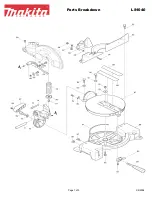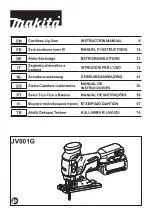
5
English
• Feed the work piece in the correct direction and speed.
Feed the work
piece into a blade, cutter, or abrasive surface against the direction of the cutting tool’s direction
of rotation only. Incorrectly feeding the work piece in the same direction may cause the work
piece to be thrown out at high speed.
• Never leave the tool running unattended, turn the power off.
Do not
leave the tool until it comes to a complete stop.
• Never start the power tool when any rotating component is in
contact with the work piece.
SERVICE
•
Have Your Power Tool Serviced by a qualified repair person using
only identical replacement parts.
This will ensure that the safety of the power tool
is maintained.
• Service Your Power Tool periodically.
When cleaning a tool, be careful not to
disassemble any portion of the tool since internal wires may be misplaced or pinched.
WArning:
rEAD AnD UnDErSTAnD ALL WArningS, CAUTiOnS AnD OPErATing
inSTrUCTiOnS BEFOrE USing THiS EQUiPMEnT. Failure to follow all
instructions listed below may result in electric shock, fire and/or serious
personal injury.
EXTEnSiOn COrDS
grounded tools require a three wire extension cord
.
Double insulated tools can
use either a two or three wire extension cord. As the distance from the power supply outlet increases,
you must use a heavier gauge extension cord. using extension cords with inadequately sized wire
causes a serious drop in voltage, resulting in loss of power and possible tool damage. Refer to the
table shown below to determine the required minimum wire size.
The smaller the gauge number of the wire, the greater the capacity of the cord. For example: a
14-gauge cord can carry a higher current than a 16-gauge cord. When using more than one extension
cord to make up the total length, be sure each cord contains at least the minimum wire size required.
If you are using one extension cord for more than one tool, add the nameplate amperes and use the
sum to determine the required minimum wire size.
guidelines for Using Extension Cords
• If you are using an extension cord outdoors, be sure it is marked with the suffix “W-A” (“W” in
Canada) to indicate that it is acceptable for outdoor use.
• Be sure your extension cord is properly wired and in good electrical condition. Always replace a
damaged extension cord or have it repaired by a qualified person before using it.
• Protect your extension cords from sharp objects, excessive heat, and damp or wet areas.
Recommended Minimum Wire Gauge for Extension Cords (120 Volt)
Nameplate
Amperes
(At Full Load)
Extension Cord Length
25 Feet
50 Feet
75 Feet
100 Feet
150 Feet
200 Feet
0–2.0
18
18
18
18
16
16
2.1–3.4
18
18
18
16
14
14
3.5–5.0
18
18
16
14
12
12
5.1–7.0
18
16
14
12
12
10
7.1–12.0
18
14
12
10
8
8
12.1–16.0
14
12
10
10
8
6
16.1–20.0
12
10
8
8
6
6
Summary of Contents for GBS900
Page 46: ...Notes...
Page 47: ...Notes...
Page 48: ...Richpower Industries Inc 736 Hampton Road Williamston SC USA www richpowerinc com...






































